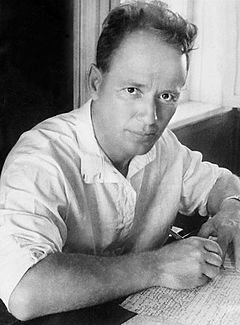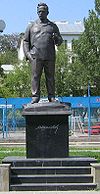- Mikhail Sholokhov
-
Michail Aleksandrovich Sholokhov 
Sholokhov, 1938Born May 24, 1905
Veshenskaya, Russian EmpireDied February 21, 1984 (aged 78)
Veshenskaya, USSROccupation Novelist Nationality Soviet Ethnicity Russian, Ukrainian Notable award(s) Nobel Prize in Literature
1965Signature 
Mikhail Aleksandrovich Sholokhov (Russian: Михаи́л Алекса́ндрович Шо́лохов) (May 24 [O.S. May 11] 1905 – February 21, 1984) was a Soviet/Russian novelist and winner of the 1965 Nobel Prize in Literature. An asteroid in main-belt is named after him, 2448 Sholokhov.
Contents
Life and work
Sholokhov was born in Russia, in the "land of the Cossacks" - the Kruzhlinin hamlet, part of stanitsa Veshenskaya, in the former Administrative Region of the Don Cossack Army.
His father, Aleksander Mikhailovich (1865–1925), was a member of the lower middle class, at times a farmer, cattle trader, and miller. Sholokhov's mother, Anastasia Danilovna Chernikova (1871–1942), the widow of a Cossack, came from Ukrainian peasant stock (her father was a peasant in the Chernihiv oblast). She did not become literate until a point in her life when she wanted to correspond with her son.
Sholokhov attended schools in Kargin, Moscow, Boguchar, and Veshenskaya until 1918, when he joined the bolsheviki side in the Russian civil war at the age of 13. He spent the next few years fighting in the civil war.
Sholokhov began writing at 17. He completed his first literary work, the short story, The Birthmark [1], at 19.
In 1922 Sholokhov moved to Moscow to become a journalist, but he had to support himself through manual labour. He was a stevedore, stonemason, and accountant from 1922 to 1924, but he also intermittently participated in writers' "seminars". His first published work was a satirical article, The Test (Oct. 19, 1923).[1]
 Mikhail Sholokhov and his wife, 1924
Mikhail Sholokhov and his wife, 1924In 1924 Sholokhov returned to Veshenskaya and devoted himself entirely to writing. In the same year he married Maria Petrovna Gromoslavskaia, the daughter of Pyotr Gromoslavsky, the ataman of the Bukanovskaya stanitsa; they had two daughters and two sons.
His first book Tales from the Don, a volume of stories about his native region during World War I and the Russian Civil War, largely based on his personal experiences, was published in 1926. The story "Nakhalyonok", partially based on his own childhood, was later made into a popular film.
In the same year Sholokhov began writing And Quiet Flows the Don which earned the Stalin Prize and took him fourteen years to complete (1926–1940). It became the most-read work of Soviet fiction and was heralded as a powerful example of socialist realism, and it earned him the 1965 Nobel Prize in Literature. It deals with the experiences of the Cossacks before and during World War I and the Russian Civil War.
Virgin Soil Upturned, which earned the Lenin Prize, took 28 years to complete. It was composed of two parts: Seeds of Tomorrow (1932) and Harvest on the Don (1960), and reflects life during collectivization in the Don area.
The short story The Fate of a Man (1957) was made into a popular Russian film.
His unfinished novel, They Fought for Their Country is about World War II fighting in the USSR (in Russia the Soviet-German war during World War II is commonly referred to as the Great Patriotic War).
 Monument to Mikhail Sholokhov in Rostov-on-Don
Monument to Mikhail Sholokhov in Rostov-on-Don
In the 1930s he wrote several letters to Joseph Stalin about the appalling conditions in the kolkhozes and sovkhozes along the Don, requesting assistance for the farmers.[2]
During World War II Sholokhov wrote about the Soviet war efforts for various journals. He also covered the devastation caused by Nazi troops along the Don. His mother was killed when Veshenskaya was bombed in 1942.
Sholokhov's collected works were published in eight volumes between 1956 and 1960.
Accusations of plagiarism
Sholokhov was accused of plagiarizing And Quiet Flows the Don, which made his international reputation. Sholokhov's detractors claimed that it was written by Fyodor Kryukov, a Cossack and Anti-Bolshevik, who died in 1920.[3][4]
The claimed evidence was circumstantial: Sholokhov's age at the time of its composition and, in particular, the alleged gulf in quality between his masterpiece and his other works.[citation needed] However, an investigation in the late 1920s upheld Sholokhov's authorship of "Quiet Don" and the allegations were denounced as malicious slander.[citation needed]
The allegations resurfaced in the 1960s with Aleksandr Solzhenitsyn as a notable proponent, possibly in retaliation for Sholokhov's scathing opinion of Solzhenitsin's novella One Day in the Life of Ivan Denisovich.[5]
A 1984 monograph by Geir Kjetsaa and others demonstrated through statistical analyses that Sholokhov was indeed the likely author of Don. And in 1987, several thousand pages of notes and drafts of the work were discovered and authenticated, including chapters excluded from the final draft.[5]
During the Second World War, Sholokhov's archive was destroyed in a bomb raid, and only the fourth volume survived. Sholokhov had his friend Vassily Kudashov, who was killed in the war, look after it. Following Kudashov's death, his widow took possession of the manuscript, but she never disclosed the fact of owning it.
The manuscript was finally found by the Institute of World Literature of the Russian Academy of Sciences in 1999 with assistance from the Russian Government.
An analysis of the novel has unambiguously proved Sholokhov's authorship. The writing paper dates back to the 1920s: 605 pages are in Sholokhov's own hand, and 285 are transcribed by his wife Maria and sisters.[6]
Communist party and Soviet state activities
Sholokhov joined the CPSU in 1932, and in 1937 he was elected to the Supreme Soviet of the Soviet Union. In 1959 he accompanied Soviet Premier Nikita Khrushchev on a trip to Europe and the United States. He became a member of the CPSU Central Committee in 1961, Academician of the USSR Academy of Sciences in 1939, and was a member of the USSR Supreme Soviet. He was twice awarded Hero of Socialist Labor, and later became vice president of the Association of Soviet Writers.
Selected writings
- Donskie Rasskazy, 1925 - Tales of the Don.
- Lazorevaja Step, 1926.
- Tikhii Don, 4 vol., 1928-1940 (The Quiet Don) - And Quiet Flows the Don (1934); The Don Flows Home to the Sea (1940); Quiet Flows the Don (1966). Sergei Gerasimov, an starring P. Glebov, L. Khityaeva, Z. Kirienko and E. Bystrltskaya was produced in 1957-1958.
- Podnyataya Tselina, 1932-1960 - Virgin Soil Upturned (1935); Harvest on the Don (1960).
- Oni Srazhalis Za Rodinu, 1942 - They Fought for Their Country.
- Nauka Nenavisti, 1942 - Hate / The Science of Hatred.
- Slovo O Rodine, 1951.
- Sudba Cheloveka, 1956-1957 - The Fate of a Man. A film version directed by Sergei Bondarchuk and starring Sergei Bondarchuk, Pavlik Boriskin, Zinaida Kirienko, Pavel Volkov, Yuri Avelin, and K. Alekseev was produced in 1959.
- Sobranie Sochinenii, 1956-1958 - collected works (8 vols.)
- Oni Srazhalis Za Rodinu, 1959 - They Fought for their Country
- Sobranie Sochinenii, 1962 - collected works (8 vols.)
- Early Stories, 1966
- One Man's Destiny, and Other Stories, Articles, and Sketches, 1923–1963, 1967
- Fierce and Gentle Warriors, 1967
- Po Veleniju Duši, 1970 - At the Bidding of the Heart
- Sobranie Sochinenii, 1975 (8 vols.)
- Rossiya V Serdtse, 1975
- SLOVO O RODINE, 1980
- Collected Works, 1984 (8 vols.)
- Sobranie Sochinenii, 1985 (collected works) (8 vols.)
- Sholokhov I Stalin, 1994
References
- ^ Ermolaev, Herman. Mikhail Sholokhov and his art. Princeton: Princeton UP, 1982. 9.
- ^ ФЭБ: Переписка.—1997 (описание)
- ^ BOOKEND; The Don Flows Again by Michael Scammell, New York Times
- ^ http://exlibris.ng.ru/fakty/2006-11-30/3_otvet.html
- ^ a b Ф. Кузнецов. Рукопись "Тихого дона" и проблема авторства (F. Kuznetsov. Rough drafts of And Quiet Flows the Don and the problem of authorship) (Russian)
- ^ http://www.trud.ru/issue/article.php?id=200005250940801
External links
- nobel-winners.com's article on Michail Sholokhov
- The State Sholokhov Reserve-Museum
- 100 years of Sholokhov, from SovLit.
- Mikhail Sholokhov at the Internet Movie Database
- On-line Sholokhov texts (Russian)
- Politicians Praise Soviet-Era Writer Mikhail Sholokhov’s Contribution to World Literature
- Sholokhov Moscow State University for Humanities
- Stremya Tihogo Dona: Solzhenitsyn's accusations of plagiarism (Russian)
- An interview with Bar-Sela (Russian)
- And Quiet Does not Flow the Don: Statistical Analysis of a Quarrel between Nobel Laureates (PDF)
- (Russian) Sholokhov: biography, photos, prose, critical essays
- Mikhail Sholokhov at Find a Grave
Nobel Laureates in Literature (1951–1975) - Pär Lagerkvist (1951)
- François Mauriac (1952)
- Winston Churchill (1953)
- Ernest Hemingway (1954)
- Halldór Laxness (1955)
- Juan Ramón Jiménez (1956)
- Albert Camus (1957)
- Boris Pasternak (1958)
- Salvatore Quasimodo (1959)
- Saint-John Perse (1960)
- Ivo Andrić (1961)
- John Steinbeck (1962)
- Giorgos Seferis (1963)
- Jean-Paul Sartre (declined award) (1964)
- Mikhail Sholokhov (1965)
- Shmuel Yosef Agnon / Nelly Sachs (1966)
- Miguel Ángel Asturias (1967)
- Yasunari Kawabata (1968)
- Samuel Beckett (1969)
- Aleksandr Solzhenitsyn (1970)
- Pablo Neruda (1971)
- Heinrich Böll (1972)
- Patrick White (1973)
- Eyvind Johnson / Harry Martinson (1974)
- Eugenio Montale (1975)
- Complete list
- (1901–1925)
- (1926–1950)
- (1951–1975)
- (1976–2000)
- (2001–2025)
Categories:- 1905 births
- 1984 deaths
- Communist Party of the Soviet Union members
- Don Cossacks
- Heroes of Socialist Labour
- Marxist writers
- Nobel laureates in Literature
- People from Rostov Oblast
- People of the Russian Revolution
- Russian communists
- Russian Nobel laureates
- Russian novelists
- Russian writers
- Soviet novelists
- Soviet short story writers
- Russian people of Ukrainian descent
- Stalin Prize winners
- Members of the Serbian Academy of Sciences and Arts
Wikimedia Foundation. 2010.

